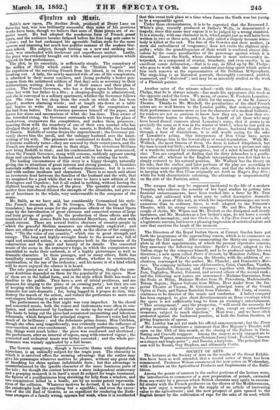The Gowrie conspiracy, though a favourite theme with disputatious historians,
is an unkindly subject for the tragic poet. The obscurity in which it is involved offers the seeming advantage that the author may -give his personages whatever motives he pleases, without any great risk of knocking his shins against indubitable facts ; but this advantage is counterbalanced by the ignoble character of the more luminous parts of the tale ; for though the contest between a stern independent aristocracy -and a grasping monarch is in itself a most fit subject for tragic treatment, the figures of a pusillanimous king shrieking for help from a window, and two conspirators killed in a bustle, are by no means potent representa- tives of the collision. Whatever motives be devised, it is hard to make the catastrophe look like anything but a squabble ; and even the execu- tion of the old Earl of Gowrie, as an expedient for rendering the Ruth- vans avengers of a family wrong, appears but weak, when it is recollected
that this event took place at a time when James the Sixth was too young to be a responsible agent.
Under these circumstances, it is to be regretted that the Reverend J. White's play, recently produced at Sadler's Wells, is denominated a tragedy, since this name may expose it to be judged by a wrong standard. It is a comedy, with one character in it, which might just as well have been "written in two or three acts, and it is only called a tragedy because some- body ie killed at the end. The fate of the Gowries and their mother, (a 'stern old embodiment of vengeance,) does not excite the slightest sym- pathy; while the grandiloquence of their wrath is rendered almost ridi- culous by the comic peculiarities of the personage against which it is directed. James the,Sixth, whose character is most unfavourably in- terpreted, as a compound of avarice, treachery, and even cruelty, is an excellent comic delineation,—that is to say, as filled up by Mr. Phelps; who goes to work with the same sedulous searching spirit which gained him such renown as the representative of Sir Pertinax M'Sycophant. The stage-king is an historical portrait, thoroughly costumed, padded, mannered, and " dialected" ; and may be as minutely studied as the work of a Flemish painter.


























 Previous page
Previous page